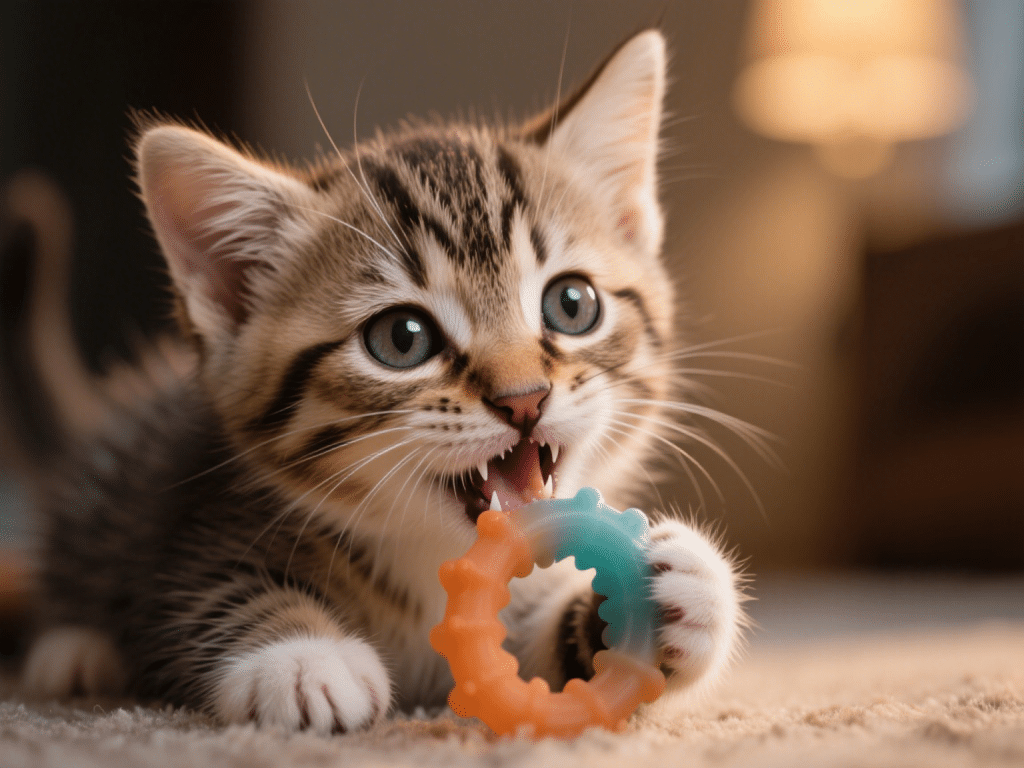
The Art of Avian Grooming: Bathing, Preening, and Feather Care
Proper grooming is essential to your bird’s health, comfort, and appearance. In the wild...

As a longtime feline veterinary nurse and kitten‑care educator, I’ve supported hundreds of families through the sometimes whirlwind experience of kitten teething. Between 3 and 6 months old, your kitten’s baby teeth give way to permanent adult teeth—a process that can bring discomfort, drooling, and an urge to chew on anything in reach. Left unaddressed, teething kittens may develop destructive habits or associate pain with positive human handling. In this guide, you’ll learn evidence‑based, compassionate strategies to soothe sore gums, protect your belongings, and strengthen your bond.
Milk Teeth Stage (0–3 months): Kittens are born toothless; by 2–4 weeks, incisors emerge, followed by canines and premolars by 6–8 weeks.
Mixed Dentition (3–6 months): Adult teeth develop beneath the baby roots. Teething discomfort peaks as incisors and canines erupt around 3–5 months.
Permanent Adult Teeth (by 7 months): Full set of 30 adult teeth in place; chewing behavior shifts from pain relief to normal exploration.
Excessive Drooling: Saliva helps flush debris around erupting teeth.
Chewing & Biting: Your kitten may gnaw on blankets, furniture, or fingers to apply counter‑pressure to sore gums.
Irritability or Withdrawal: Pain can reduce appetite or increase hiding.
Red, Inflamed Gums: A quick visual check shows reddened gum margins around erupting teeth.
Frozen Washcloth: A clean, damp washcloth chilled in the freezer makes a gentle teething ring—cold numbs pain, and soft fabric won’t damage tender gums.
Veterinary-Grade Chew Toys: Provide textured rubber toys designed for kittens; avoid hard plastic or untreated sticks that can chip teeth.
Edible Dental Treats: Kibble-shaped biscuits formulated for kittens offer dual benefits of chewing relief and oral hygiene.
Gentle Gum Massage: Using a gloved finger or soft silicone brush, apply light circular motions to gums—only after vet approval if gums appear severely inflamed.
Kitten-Proof Zones: During peak teething weeks, restrict access to delicate textiles, electrical cords, and small objects.
Redirect Immediate Bites: When your kitten sinks teeth into your hand during play, calmly withdraw and present an approved chew toy. Consistency teaches correct outlets.
Praise and Treats: Immediately reward gentle chewing with praise and a small treat to reinforce positive behavior.
Softened Kibble: Moisten dry food with warm water or kitten‑safe broth to ease chewing for 4–6 weeks.
High‑Protein, Balanced Diet: Energy demands increase; choose AAFCO‑certified kitten formulas to support healthy tooth and bone development.
Hydration: Ensure fresh water is always available; consider a pet water fountain to encourage drinking and reduce tartar buildup.
Persistent Bleeding or Swelling: Normal teething may produce light bleeding, but heavy bleeding or abscess formation warrants immediate attention.
Refusal to Eat for >24 Hours: Anorexia can lead to hypoglycemia in small kittens.
Unilateral Chewing Preference: Consistent chewing only on one side may indicate a retained baby tooth (“odontoma”) requiring extraction.
“Providing a variety of textures and temperatures is key,” explains Dr. Karen Li, DVM. “Kittens benefit from rotating chilled and room‑temperature chew options to find the right comfort level.”
Teething is a normal—but sometimes challenging—stage in your kitten’s development. By understanding the timeline, recognizing discomfort signs, and offering safe, soothing chew options, you can ease that transition. With patience, consistency, and expert‑backed techniques, you’ll safeguard your furniture, your fingers—and most importantly, your kitten’s comfort and well‑being.

Proper grooming is essential to your bird’s health, comfort, and appearance. In the wild...

IntroductionRaw feeding, also known as the BARF (Biologically Appropriate Raw Food) diet, ...

IntroductionFleas cause itching, skin irritation, and can transmit tapeworms. While chemic...

IntroductionGentle massage promotes relaxation, improves blood flow, and strengthens the b...

Dental health is often overlooked in dogs, yet it plays a vital role in their overall well...

IntroductionEar infections (otitis externa) are common in dogs, especially those with flop...
Comments on "Managing Kitten Teething: Proven Tips to Ease Those Sore Gums" :